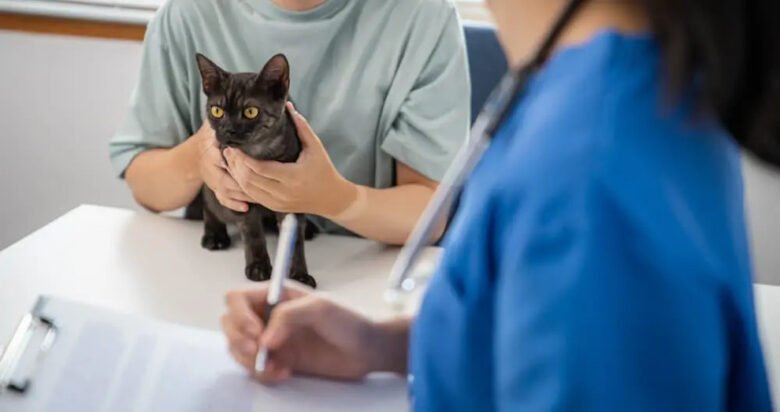Being a cat owner is fun and makes you feel connected to your pet, but you have to take care of your cat’s health. Knowing how to recognize the signs of common diseases is one of the most important parts of caring for your cat. Knowing the symptoms can help ensure your cat gets medical attention when needed and stays healthy. This article explains how to tell if your cat is sick and what to do if you see the signs.
Behavioral Change:
Changes in your cat’s behavior are one of the first signs that he may be ill. Cats have traits and habits that make them unique, so pay attention if they behave differently than normal. If your cat is acting distant or hiding more than usual, it could mean that your cat is sick. On the other hand, if a normally calm cat becomes too angry or hostile, this could also be a sign of a medical problem. These changes can give you early signals about your cat’s health, so keep an eye on them.
Changes in Appetite and Weight:
Changes in your cat’s appetite are important signs that he may have a health problem. Rapid changes in appetite can be a sign of a variety of diseases. For example, if your cat isn’t eating as much as usual, it could mean he has dental problems, stomach problems, or even something more serious like kidney disease. On the other hand, increased hunger can be a sign of diabetes or hyperthyroidism. Changes in weight should also be noted. If they lose or gain weight suddenly, it’s a good idea to take the hat to the vet for a full check-up.
Changes in Water Intake and Urination:
Just like changes in your cat’s appetite, changes in the way your cat drinks and urinates can also be signs of health problems. If you notice that your cat is drinking more water or going to the toilet more often, this could be a sign that your cat has diabetes or kidney disease. On the other hand, if your cat seems to be drinking less water or is having trouble urinating, it could mean he has a urinary tract disorder or a kidney problem. Paying close attention to these changes and letting your doctor know can help with early diagnosis and treatment.
Vomiting and Diarrhea:
People often experience vomiting and diarrhea, which can be a sign of a variety of problems, from minor digestive problems to more serious illnesses. If your cat vomits occasionally, it’s probably not a problem, but if it happens often, you should be concerned. If you continue to have stomach problems, it could be a sign that you have bacteria, inflammatory bowel disease, or a food allergy. Consult your veterinarian right away if these symptoms last for more than a day or are present along with other symptoms of illness.
Breathing Problems:
Cats with respiratory conditions may cough, sneeze or have difficulty breathing. Disease, allergies, or a more serious condition like asthma or a respiratory infection may be the cause of these signs and symptoms. If your cat is coughing a lot or has a persistently runny nose, this could be a sign of an upper respiratory infection. Difficulty breathing or wheezing can be more dangerous and may require an immediate vet visit. Paying close attention to these symptoms and other signs of discomfort can help you spot the problem.
Skin and Coat Changes:
A cat’s skin and coat can tell you a lot about his or her health. If their coat undergoes changes, such as shedding a lot, developing bald spots or looking dull, it could mean they have a health problem. Itchy, red, or bumpy skin can be a sign of allergies, infections, or insects. If you notice any changes in your cat’s skin or coat, take her to the vet. You may discover these problems sooner if you clean and check your pet regularly.
The Health of Your Eyes and Ears:
If your cat’s eyes and ears change, it could also mean he is sick. Your cat’s eyes should be clear and bright, with no discharge. If your cat’s eyes are red, moist, or have discharge, it could mean he is sick, has allergies, or has other problems. Again, your cat’s ears should be clean and have nothing stuck in them. If you notice that your cat’s ears are swollen, have discharge, or have a bad odor, it could be a sign that he has mange or mites. You can detect these problems early if you check your cat’s eyes and ears regularly.
Feeling Tired and Weak:
Another major sign that your cat is sick is if he is tired or weak. If your cat is usually busy but tires easily, sleeps a lot, or has trouble exercising, it could be a sign of a serious health problem. There are many things that can make you feel tired, such as infections, anemia or long-term illness. If you notice a significant change in your cat’s energy level, you should consult your vet to find out what the problem is and how to treat it.
Healthy Teeth:
People often forget about their cats’ dental health, but it is very important for their overall health. Dental problems can cause pain, difficulty eating, and even spread to other parts of the body. Bad odor, swollen gums and difficulty chewing are all signs of dental problems. If you notice any of these symptoms, you should have your cat’s teeth and gums checked by your vet. Regular checkups and cleanings of your cat’s teeth can help prevent these problems and keep your teeth healthy.
Conclusion:
Paying close attention to the signs of common cat diseases can have a significant impact on your cat’s health and well-being. From changes in your cat’s behavior and appetite to lung and dental problems, each sign can tell you a lot about what’s wrong. Monitor your cat’s health and take her to the vet if necessary. This will help your furry friend stay healthy and happy.
FAQs:
1. What should I do if my cat vomits heavily?
Frequent vomiting can be a sign of many health problems. Pay close attention to your cat’s signs and take him to your vet for a complete examination.
2. How do I know if I think my cat has a cold?
Coughing, sneezing and difficulty breathing are all symptoms of respiratory viruses. If these symptoms do not go away, you should consult your doctor.
3. What are the most common signs that a cat’s teeth are injured?
A bad odor, swollen gums and difficulty eating are all common symptoms. Taking your cat to the vet for regular checkups can help keep his teeth healthy.
4. How can I control my cat’s weight?
Monitor what your cat eats, don’t overfeed it and make sure it gets regular exercise. Talk to your vet about how you can help your pet lose weight.
5. When should I take my cat to the vet?
If you notice signs that do not go away or get worse, such as changes in your pet’s behavior, appetite or breathing, you should consult your veterinarian immediately to rule out medical problems.



